
The Amazonas Department is a department of Southern Colombia in the south of the country. It is the largest department in area while also having the 3rd smallest population. Its capital is Leticia and its name comes from the Amazon River, which drains the department.
The Peba–Yaguan language family is located in the northwestern Amazon, but today Yagua is the only remaining spoken language of the family.

Yagua are an indigenous people in Colombia and northeastern Peru, numbering approximately 6,000. Currently, they live near the Amazon, Napo, Putumayo and Yavari rivers and their tributaries. As of 2005, some Yagua have migrated northward to Colombia, near the town of Leticia.
The Yagua language is spoken primarily in northeastern Peru by the Yagua people. As of 2005, it appears that a few speakers may have migrated across the Peruvian-Colombian border near the town of Leticia. A third of the population is monolingual, and Yagua is the language of instruction in local primary schools.
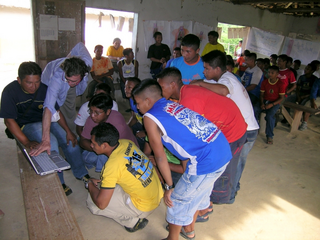
Baniwa are South American Indians, who speak the Baniwa language belonging to the Maipurean (Arawak) language family. They live in the Amazon Region, in the border area of Brazil, Colombia and Venezuela and along the Rio Negro and its tributaries.
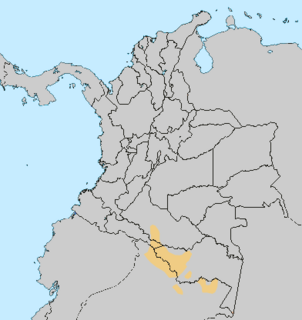
Bora–Witóto is a proposal to unite the Boran and Witotoan language families of southwestern Colombia and neighboring regions of Peru and Brazil. Kaufman (1994) added the Andoque language.
More than 99.2% of Colombians speak the Spanish language; also 65 Amerindian languages, 2 Creole languages, the Portuguese language and the Romani language are spoken in the country. English has official status in the San Andrés, Providencia and Santa Catalina Islands.
The languages of Venezuela refers to the official languages and various dialects spoken in established communities within the country. In Venezuela, Castillan is the official language and is the mother tongue of the majority of Venezuelans. Although there is an established official language, there are countless languages of indigenous villages spoken throughout Venezuela, and various regions also have languages of their own.

The Guacara Municipality is one of the fourteen municipalities (municipios) that make up the Venezuelan state of Carabobo. according to the 2011 census by the National Institute of Statistics of Venezuela, the municipality has a population of 176,218. The town of Guacara is the shire town of the Guacara Municipality.

The following outline is provided as an overview of and topical guide to South America.
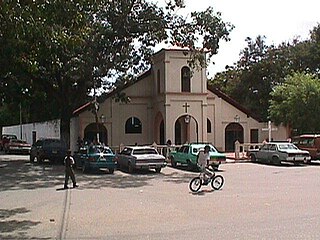
Yagua is a Venezuelan town located to the Northwest of the Valencia Lake, in the Guacara Municipality in the Carabobo State. The area corresponds to the rural parish of the same name.
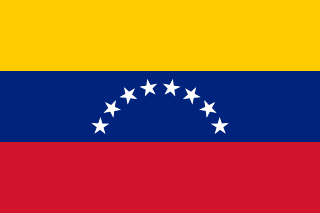
Venezuelan people are people identified with Venezuela. Venezuelans are predominantly Roman Catholic and speak Spanish. The majority of Venezuelans are the result of a mixture of Europeans, Africans and Amerindians. Approximately 51.6% of the population are Pardos of mixed European, African, and Amerindian ancestry; and 33.6% of Venezuelans identify as European or Middle Eastern. An additional 13.6% identify as full or predominantly Black/African-descendants, while 2.7% identify as fully Amerindians.
Venezuelan Sign language or VSL is the national deaf sign language of Venezuela. The term, "Venezuelan Sign Language," began to be used in the 1930s. It is widely used, and Venezuela has a national bilingual education program for VSL and Spanish, though the language used by adults differs from that of the classroom. There is a large VSL dictionary published by the Federación Venezolana de Sordos. VSL has been used in schools since 1937.
The Intercontinental Dictionary Series is a large database of topical vocabulary lists in various world languages. The general editor of the database is Bernard Comrie of the Max Planck Institute for Evolutionary Anthropology, Leipzig. Mary Ritchie Key of the University of California, Irvine is the founding editor. The database has an especially large selection of indigenous South American languages and Northeast Caucasian languages.

Indigenous people in Venezuela, Amerindians or Native Venezuelans, form about 2% of the total population of Venezuela, although many Venezuelans share some indigenous ancestry. Indigenous people are concentrated in the Southern Amazon rainforest state of Amazonas, where they make up nearly 50% of the population and in the Andes of the western state of Zulia. The most numerous indigenous people, at about 200,000, is the Venezuelan part of the Wayuu people who primarily live in Zulia between Lake Maracaibo and the Colombian border. Another 100,000 or so indigenous people live in the sparsely populated southeastern states of Amazonas, Bolívar and Delta Amacuro. There are at least 26 indigenous groups in Venezuela, including the Ya̧nomamö, Pemon, Warao people, Baniwa people, Kali'na people, Motilone Barí, Ye'kuana and Yaruro.
The Achagua are an indigenous people of Colombia and Venezuela. At the time of the Spanish colonization of the Americas, their territory covered the present-day Venezuelan states of Bolívar, Guárico and Barinas. In the late twentieth century there were several hundred Achaguas remaining.
Venezuelan Australians refers to Australian citizens of Venezuelan descent or birth. According to the 2011 Census there were 3,404 Venezuelan-born citizens who were residing in Australia at the moment of the census. There are an estimated 10,000 Australians of Venezuelan ancestry according to a study of Ivan De La Vega from Simón Bolívar University.
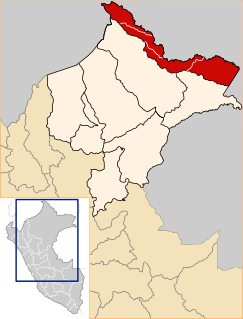
Yaguas is a district of the Putumayo Province in Peru, and one of the four districts that comprise that province.
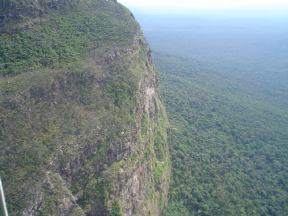
The Yapacana National Park Also Cerro Yapacana National Park Is a protected area with the status of national park in the South American country of Venezuela which was formed on December 12, 1978 by executive decree of President Carlos Andres Perez. It is located southwest of the confluence of the Ventuari River on the Orinoco River, in the jurisdiction of the Atabapo municipality of Amazonas state.

Liz Chicaje Churay is an indigenous Peruvian leader who has contributed significantly to the protection of rainforests and rivers in the Loreto area of northeastern Peru, safeguarding the rights of the Yagua people. Thanks to her efforts, the Yaguas National Park was established in 2018. In January 2019 in Lima, she was awarded the Franco-German prize for human rights by the French and German ambassadors.











